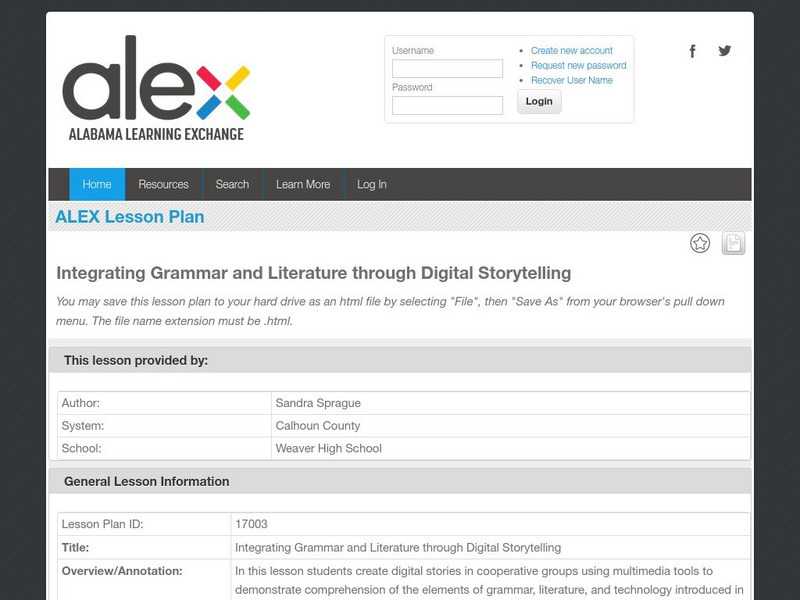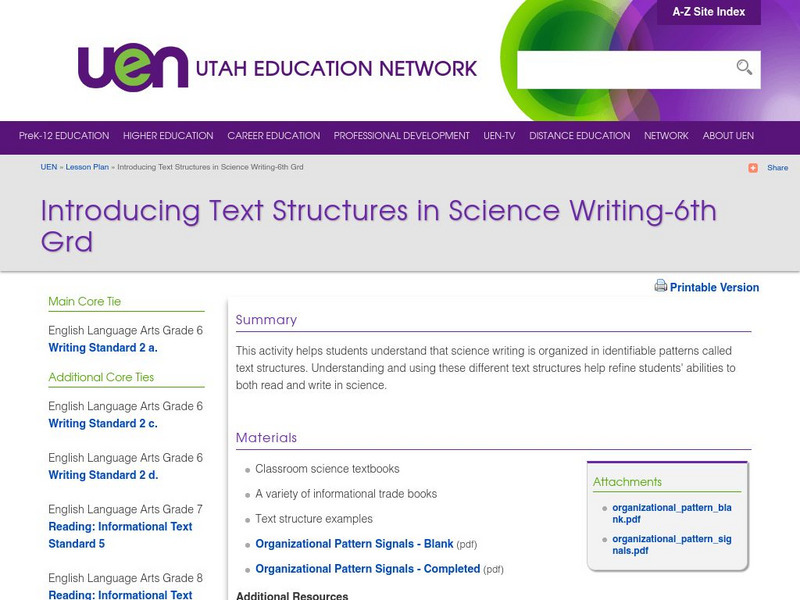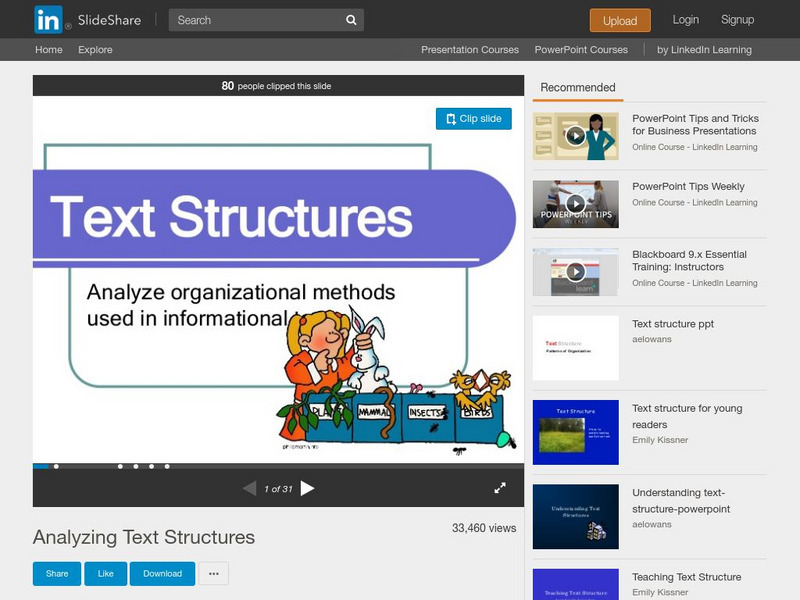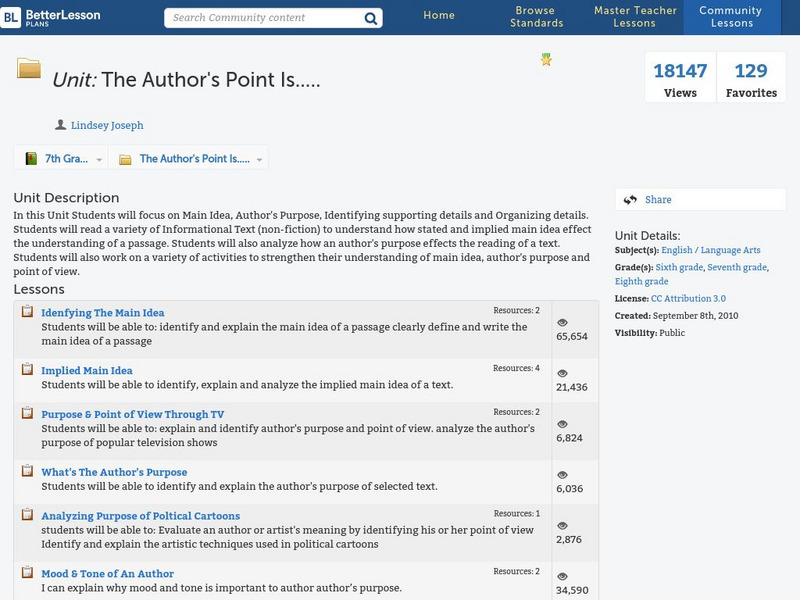Writing Fix
Writing Fix: Writing Scientific "Recipes"
Adapted from a lesson in the book 51 Wacky We-Search Reports by Barry Lane, this lesson asks students to read several recipes to gain an understanding of how they are written and the types of words they use. Then students demonstrate...
Curated OER
Mc Graw Hill: Use Details and Examples
Review how to use text evidence, details, examples, and personal experiences to make inferences then read a passage to practice on your own.
Curated OER
Mc Graw Hill: Structure Within a Story
Learn why structure is important when organizing a story then read an excerpt from the story "Three over Four" to practice how structure helps to develop the story's theme, setting, and plot.
InterLink Language Centers
Interlink Language Centers: Reading Exercises Science
An interactive exercise for students to use while developing an understanding of how to read scientific informational texts. The text is presented one paragraph at a time and difficult vocabulary words are defined as footnotes. Then...
McGraw Hill
Mc Graw Hill:informational Text: Analyze Development of Text Elements:individuals
Read an informational piece, and learn how to analyze the development of individuals in the text. Includes practice exercises.
McGraw Hill
Mc Graw Hill: Informational Text: Analyze Development of Text Elements: Events
Read an informational piece, and learn how to analyze the development of an event in the text.
Other
Writing Scientific Reports
This tutorial site provides links to articles about writing a scientific report or essay as well as to sample essays.
Alabama Learning Exchange
Alex: Grammar and Literature Through Digital Storytelling
In this lesson young scholars create digital stories in cooperative groups using multimedia tools to demonstrate comprehension of the elements of grammar, literature, and technology introduced in the lesson. Students become actively...
Other
Interacting Texts Directed Activities Related to Texts (Darts)
Want to improve your students' reading skills? This is a good place to find the types of directed activities, using a definition text, reconstruction/analysis activities, and advantages of using DARTs.
Grammarly
Grammarly Handbook: Analysis
This page explains that analysis is crucial to the success of a paper as it answers the questions how and why and shows the reader that the writing is knowledgable. Logic and development work together to make the analysis clear. Examples...
Annenberg Foundation
Annenberg Learner: Journey North: Reading Strategies: Identify Author's Viewpoint
This reading resource discusses the strategy of identifying an author's viewpoint. A list of guiding questions is provided to help students as they analyze the author's viewpoint.
Science Education Resource Center at Carleton College
Serc: Reading Reflections
An exercise consisting of three reflective questions that students respond to after completing an assigned reading in any curriculum area. The task promotes skills in critical thinking and self-assessment.
Other
Prezi: Inference Lesson 8th Grade
Learn what it means to make an inference by combining the author's clues and your background knowledge.
Utah Education Network
Uen: Lesson Plan: Text Structures in Science Writing
Lesson for teaching students to identify components of scientific texts and to use similar structures in their own scientific writing.
Tom Richey
Slide Share: Text Structures: Analyze Organizational Methods
This slideshow focuses on text structures for informational texts including how the author's purpose helps determine the organizational pattern to use and how the reader can use clues to identify the text structure used. Five...
Read Works
Read Works: Developing Possible Solutions
[Free Registration/Login Required] An informational text about solving problems. A question sheet is available to help students build skills in reading comprehension.
Read Works
Read Works: Jumping Bodies
[Free Registration/Login Required] Students read a story about a boy named Charles who has the ability to switch bodies. A question sheet is available to help students build skills in reading comprehension.
E Reading Worksheets
E Reading Worksheets: Author's Purpose: Reading Test 2
A ten-question quiz on identifying whether an author's purpose is to persuade, inform, or entertain the reader. Students are asked to type an explanation for each answer. Results can be printed, saved, or emailed.
E Reading Worksheets
E Reading Worksheets: Author's Purpose: Reading Test 3
A ten-question quiz on identifying whether an author's purpose is to persuade, inform, or entertain the reader. Students are asked to type an explanation for each answer. Results can be printed, saved, or emailed.
Better Lesson
Better Lesson: Unit: The Author's Point Is
Middle schoolers will focus on Main Idea, Author's Purpose, Identifying supporting details and Organizing details. Students will read a variety of Informational Text (non-fiction) to understand how stated and implied main idea effect the...
Tom Richey
Slide Share: Author's Purpose and Point of View
This downloadable slideshow focuses on how an author's purpose and point of view work together in fiction and nonfiction, and how to identify the point of view.
University of North Carolina
University of North Carolina: Writing Center: Handouts: Writing About Science
Information and specific tips on what scientific writing is and how to make it more precise, clear, and objective.
CommonLit
Common Lit: A Slick Little Robot
CommonLit.org is a wonderful resource to use in a Language Arts classroom. Each story or article is accompanied by guided reading questions, assessment questions, and discussion questions. In addition, students can click on words to see...
CommonLit
Common Lit: Ataka
CommonLit.org is a wonderful resource to use in a Language Arts classroom. Each story or article is accompanied by guided reading questions, assessment questions, and discussion questions. In addition, students can click on words to see...



















